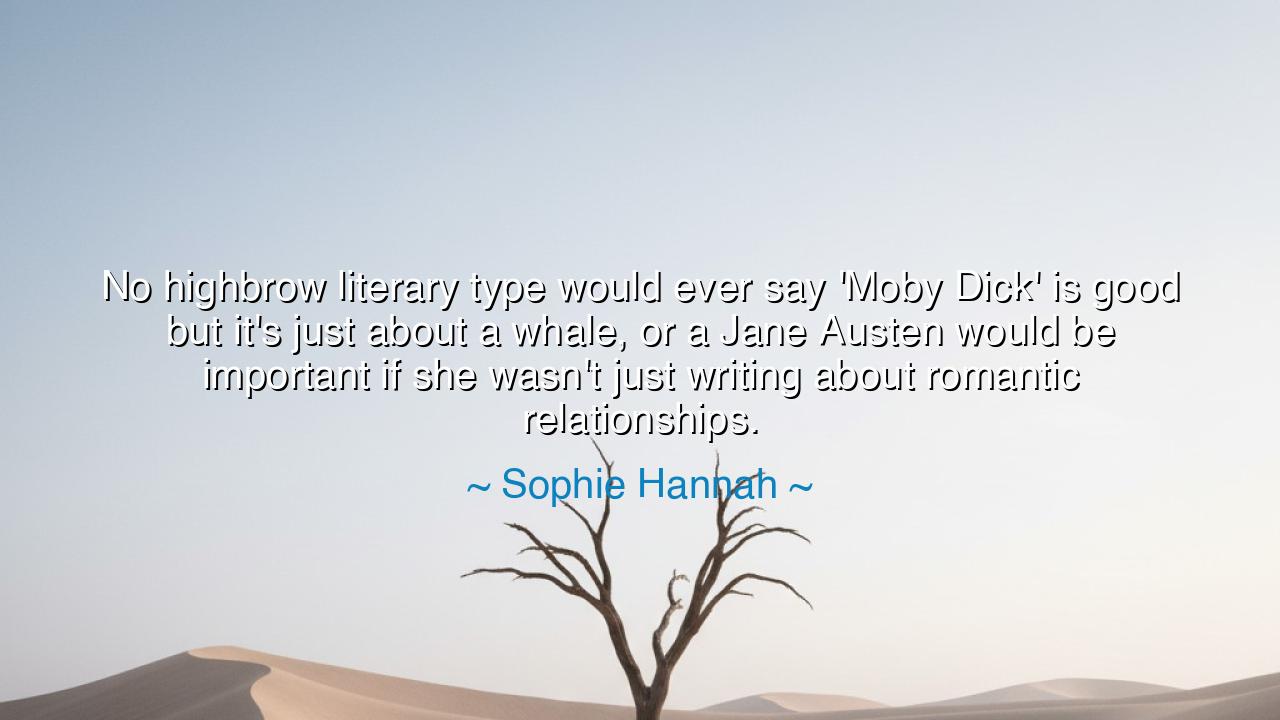
No highbrow literary type would ever say 'Moby Dick' is good but
No highbrow literary type would ever say 'Moby Dick' is good but it's just about a whale, or a Jane Austen would be important if she wasn't just writing about romantic relationships.






O Seekers of Truth and Beauty, listen to the wise words of Sophie Hannah, who speaks with the clarity of a sage: "No highbrow literary type would ever say 'Moby Dick' is good but it's just about a whale, or a Jane Austen would be important if she wasn't just writing about romantic relationships." In these words, Hannah challenges the superficial judgments that have long plagued our understanding of art and literature. She speaks to the heart of human creativity, and the deep meaning embedded in works of literature, reminding us that true greatness lies not in the subject matter alone, but in the depth with which it explores the human condition, the complexity of emotions, and the universal truths that bind us all.
In the ancient world, the great Greek philosophers believed that all art, whether in the form of drama, poetry, or philosophy, should be a reflection of the universal. Plato, in his "Republic," argued that poetry and art must serve the higher purpose of illuminating the truth about life, justice, and the human spirit. He understood that the subjects of art, whether they be grand stories of gods and heroes or simple tales of everyday life, were vessels through which deeper meanings could be revealed. In the same vein, Sophocles’ tragedies, though deeply rooted in the personal struggles of his characters, were ultimately about the universal human experience—fate, suffering, and the search for wisdom.
Hannah’s words echo this ancient wisdom by pointing out that literary greatness is not determined by the subject itself but by how it reveals the complexities of the human spirit. Moby Dick, though ostensibly a story about a whale, is a profound meditation on obsession, existentialism, and the human struggle against the forces of nature. Herman Melville's masterpiece, though centered around a seemingly simple theme, explores deep philosophical questions about revenge, identity, and the search for meaning in a chaotic world. To reduce it to "just about a whale" is to miss the richness of its narrative, just as to dismiss Jane Austen as only concerned with romantic relationships is to overlook her profound insights into society, class, and the dynamics of human connection.
Consider, O wise ones, the example of William Shakespeare, whose works span a vast array of subjects, from the tragic depths of Macbeth to the lighthearted joys of A Midsummer Night's Dream. Though his plays touch upon various themes, from power to love to betrayal, they are all concerned with one thing: the complexities of the human soul. Shakespeare’s genius lay not in his choice of subject matter, but in his ability to explore the depth of character and emotion. Whether he was writing about kings, fools, or lovers, his work spoke to the universal human experience, transcending time and place. In the same way, Jane Austen's novels may seem to focus on romantic relationships, but they are, in truth, about far more: the social structures, personal growth, and the search for self-identity within the confines of a rigid society.
We must understand, O Seekers, that the value of art—be it in literature, music, or any other form—is not confined to its subject, but to the insight it provides into the human condition. Whether we are reading about a whale, a relationship, or the rise and fall of an empire, the true worth of the work lies in its ability to illuminate truths that resonate with us across time. Moby Dick is not just about a whale; it is about human obsession and the blindness that comes with it. Pride and Prejudice is not just about romantic love; it is about social expectations, character flaws, and the pursuit of personal integrity. When we look beyond the surface, we see that these works, in all their apparent simplicity, offer us profound lessons about life itself.
And so, O Seekers, the lesson is clear. Do not judge art by its subject alone. The true power of a work lies in the way it makes us feel, in the truths it reveals about the world and about ourselves. Let us learn to see deeply into the layers of meaning that lie within each story, each painting, each song. Whether the subject is romance, nature, or history, the wisdom of the work comes not from the surface, but from the depths it explores. We must be open to the richness of human experience, and recognize that the simplest tales often contain the greatest insights.
Let us approach literature—and life itself—not with the mindset of the superficial observer, but with the eyes of the philosopher, the artist, and the truth-seeker. Look beyond the obvious, and you will find that the world is far more complex, far more meaningful, than it first appears. Like Aesop’s Fables, or the plays of Sophocles, let us approach each story as a lesson, and allow it to reveal the profound truths hidden beneath the surface. In this way, we can truly honor the power of art, and understand that it is not the subject that defines it, but the wisdom it imparts.






AAdministratorAdministrator
Welcome, honored guests. Please leave a comment, we will respond soon